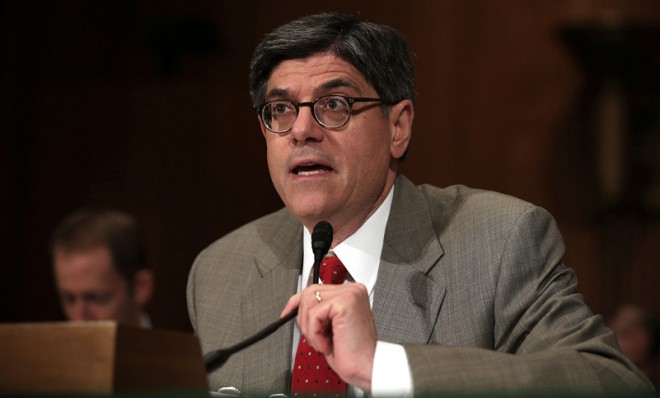The debt ceiling fight just got real
Brace yourself for financial armageddon

A free daily email with the biggest news stories of the day – and the best features from TheWeek.com
You are now subscribed
Your newsletter sign-up was successful
On Wednesday, Treasury Secretary Jack Lew wrote a letter to Speaker John Boehner (R-Ohio) warning that the U.S. will hit its debt ceiling earlier than expected.
By October 17, the U.S. will have only $30 billion in cash to pay its bills — compared to the $50 billion Lew estimated a few weeks ago.
"This amount would be far short of net expenditures on certain days, which can be as high as $60 billion," wrote Lew. "If we have insufficient cash on hand, it would be impossible for the United States of America to meet all of its obligations for the first time in our history."
The Week
Escape your echo chamber. Get the facts behind the news, plus analysis from multiple perspectives.

Sign up for The Week's Free Newsletters
From our morning news briefing to a weekly Good News Newsletter, get the best of The Week delivered directly to your inbox.
From our morning news briefing to a weekly Good News Newsletter, get the best of The Week delivered directly to your inbox.
If $30 billion sounds like a lot, keep in mind that the Treasury takes care of around 80 million payments a month, which are not dispersed evenly. "On Nov. 1 alone, it needs to spend $18 billion on Medicare, $25 billion on Social Security, $12 billion on military pay and veterans benefits, and $3 billion on the Supplemental Security Income program," says Annie Lowrey at The New York Times. If Congress doesn't reach an agreement by October 17, the country could default on "any given day" after that.
If that happens, you can bet on "a kind of constitutional meltdown that will permanently shake confidence in the American financial and political system," says Matt Yglesias at Slate.
The mere possibility of default during 2011's drawn-out debt ceiling debate cost the market an estimated $19 billion over 10 years. Though the exact cost of default is impossible to calculate, "financial analysts anticipate a violent market reaction that might raise federal borrowing costs, slow the recovery, and destabilize markets around the world," writes Lowrey.
To make the situation even more tense, the letter arrives as Congress is trying to pass a new budget and avoid a government shutdown. There's no telling whether Congress will pass a bill before the Sept. 30 deadline, and even it did, that would leave the legislature with only around two weeks to come to an agreement on the debt ceiling.
A free daily email with the biggest news stories of the day – and the best features from TheWeek.com
So will Congress get its act together in time?
"Democrats, more moderate Republicans, and businesses want to avoid the negative consequences of debt ceiling brinksmanship and fight for their policy priorities another day," says Tim Fernholz at Quartz.
But certain House Republicans seem prepared to take the country to the brink again, and are reportedly considering loading any debt ceiling hike with a Christmas tree's worth of unrelated provisions, including ones that would delay ObamaCare, approve the Keystone pipeline project, overhaul the U.S. tax code, and block some of the Environmental Protection Agency's carbon emissions regulations.
Some Republicans have already floated the idea of allowing the Treasury to prioritize certain bills if the Oct. 17 deadline is passed without an agreement, says CNN — an idea the Bipartisan Policy Center has already described as "infeasible."
Meanwhile, the Obama administration is holding strong on its earlier promise not to negotiate over the debt ceiling. And there's plenty of reason to think that the president won't buckle.
Carmel Lobello is the business editor at TheWeek.com. Previously, she was an editor at DeathandTaxesMag.com.
-
 How the FCC’s ‘equal time’ rule works
How the FCC’s ‘equal time’ rule worksIn the Spotlight The law is at the heart of the Colbert-CBS conflict
-
 What is the endgame in the DHS shutdown?
What is the endgame in the DHS shutdown?Today’s Big Question Democrats want to rein in ICE’s immigration crackdown
-
 ‘Poor time management isn’t just an inconvenience’
‘Poor time management isn’t just an inconvenience’Instant Opinion Opinion, comment and editorials of the day